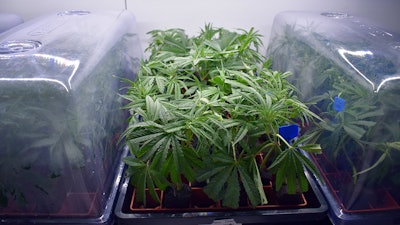
Certificates of operation are on their way to Ohio cannabis businesses planning on supplying the state’s commercial adult-use marketplace.
These certificates are currently available to Ohio’s existing medical cannabis licensees who applied for and secured provisional licensure—a placeholder for adult-use operations. The state’s Division of Cannabis Control (DCC) opened this application process on June 7.
The division had approved 208 provisional licenses for dual-use operations as of July 12, according to the state’s licensing database:
- 6 testing laboratories (of 8 operational licensees in the medical market)
- 22 Level I cultivators (of 22 in the medical market)
- 12 Level II cultivators (of 14 in the medical market)
- 40 processors (of 45 in the medical market)
- 128 dispensaries (of 128 in the medical market)
Now that DCC officials have issued provisional licenses to nearly every Ohio medical cannabis licensee planning to participate in dual-use operations for both the medical and adult-use cannabis programs, the division is working toward issuing the certificates of operation.
This next step—essentially giving business applicants the green light to kick-start the adult-use marketplace—is more cumbersome than the provisional licensing process, said Jason Erkes, chief communications officer at Chicago-based multistate operator Cresco Labs.
One of the largest publicly traded cannabis companies in the world by market cap, Cresco Labs operates a Level I greenhouse cultivation and processing facility in Yellow Springs, Ohio, just outside Dayton, as well as Sunnyside dispensaries in Cincinnati, Wintersville, Newark, Marion and Chillicothe.
“The first step was really just filing an application and providing documents,” Erkes told Cannabis Business Times.
“The next step, there’s actually some physical things that need to take place, like an inspection, testing security, and staffing requirements—things like that,” he said. “Those are the things that are happening now, and we’re going to see those happen on the cultivation and lab side first because no stores will be able to sell product that doesn’t come from an approved supplier.”
For dispensaries, this also means having updated point-of-sale systems that can accommodate both medical and adult-use cannabis transactions. Ohio’s seed-to-sale tracking system and employee badging requirements must also be in place across the supply chain.
The DCC is prioritizing dual-use licensure in the order of the supply chain, meaning cultivators, processors and testing laboratories will begin receiving certificates of operation before dispensaries, Jamie Crawford, public information officer with the Ohio Department of Commerce, previously told Cannabis Business Times.
He said DCC officials will also award these certificates in batches to companies in roughly the order in which they submitted their dual-use applications. The DCC has yet to publicly issue the first batch.
Specifically, Cresco Labs has the first listed license numbers among Level I cultivators and processors and also among retailers for two of its five Sunnyside dispensaries, according to the DCC’s licensing database.
While DCC regulators may schedule in-person site inspections for some facilities before issuing certificates of operation, others may only require a virtual inspection or a phone call. Most of Ohio’s medical licensees applying for dual-use licensure are well-established businesses with records of meeting compliance standards under the state’s Medical Marijuana Control Program.
Erkes said the licensing process is “definitely moving.”
“We’re getting there,” he said. “There are a lot of steps in the process, but they’re doing it the right way, and they’re being very thoughtful about their approach—it’s very methodical. So, we certainly have respect for that.”
When Ohio launches adult-use sales, it will be the 21st state in the nation to do so: Virginia (where a sales rollout is currently dead), Delaware and Minnesota legalized adult-use cannabis before Ohio but have yet to commence sales. Virginia legalized adult-use possession and home grows in 2021, but Gov. Glenn Youngkin vetoed the state legislature’s most recent attempt to implement a commercial marketplace.
Although Ohio’s cannabis operators anticipate that adult-use sales could begin at any time in the coming weeks, the state’s voter-approved legalization measure requires that the DCC issue adult-use dispensary licenses by Sept. 7, 2024—nine months after the measure’s effective date.
Since Dec. 7, 2023, the effective date, Ohioans 21 and older have been allowed to legally possess up to 2.5 ounces of cannabis flower and grow up to 6 plants per person or 12 plants per household.
While roughly 130 existing medical dispensaries and nearly 40 cultivators will be the first to serve Ohioans and out-of-state customers in a commercial adult-use setting, the DCC plans to issue another roughly 170 dispensary licenses to Ohio’s medical cannabis companies and 50 dispensary licenses to social equity operators—approximately 350 total.
Also included in Ohio’s voter-approved initiative, the state will issue 40 new “Level III” cultivation licenses, with a preference for applicants participating in a social equity and jobs program, according to the initiative text. The statute limits these new cultivation facilities to 5,000 square feet of grow space unless the DCC authorizes them to expand.
The DCC must review market conditions biannually, beginning 24 months after the first batch of adult-use licenses is issued. Based on these biannual reviews, the division can issue additional permits.


























